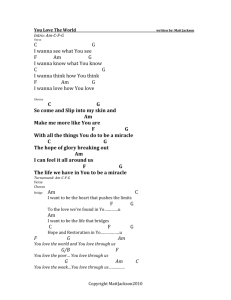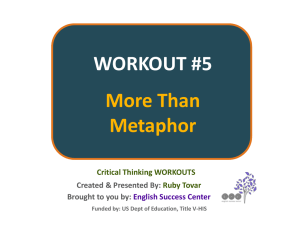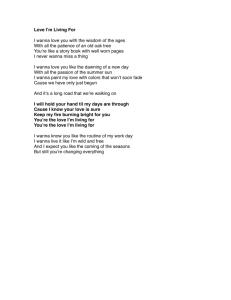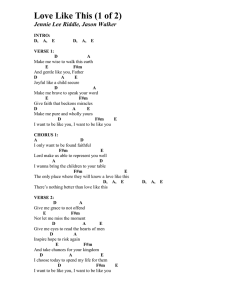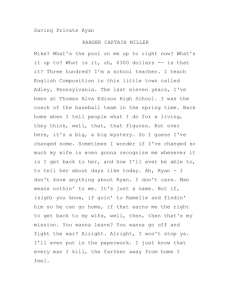What is Policy? - openpolicyontario
advertisement
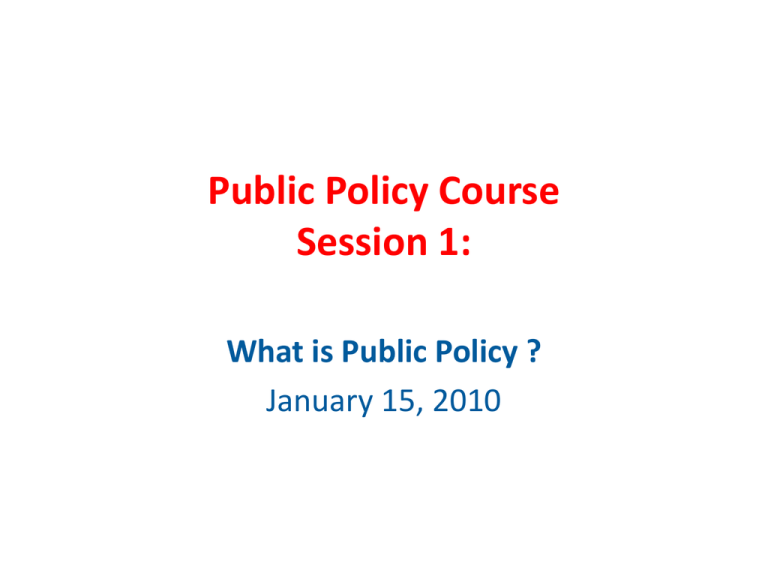
Public Policy Course Session 1: What is Public Policy ? January 15, 2010 Objectives 1. To clarify some basic vocabulary: public policy, policy development. 2. To better understand the idea of policy as the language of governments – it is “what they do.” 3. To explore common errors – the difference between good and bad policy. 4. To investigate whose job it is to develop public policy options. 2 What is Policy? • Small ‘p’ policy is the articulation of a “standard.” • Big ‘P’ policy is the articulation of a course of action; eg. Obama/Change. (Sherri Torjman – What is Policy? Caledon Institute, www.caledoninst.org) • What is a policy to “parking lot attendant”? 3 Big “P” Policy • Big ‘P’ policy is the articulation of a plan/course of action intended to influence and determine: – Decisions – Actions – Other matters (Adapted from Answers.com) 4 Where is Policy Announced? • Throne Speech • Study • Budget • Economic statements • “Announceables” 5 How is Policy Implemented? • Acts (Law) • Regulations • Directives • Guidelines 6 7 Key Messages 1. There is a difference between politics and policymaking. 2. There are different lenses through which to see an issue. 3. Compelling stories based on shared values can frame evidence. 4. Constituencies matter: anti-poverty, arts, environment, housing…… 8 Policy is the Language of Governments – ‘it’s what they do’ • We have no choice but to understand some of the basics of policy analysis and development if we wish to be engaged in the policy arena. • Think of the trouble we would be in if governments did not do good policy… – If they followed the last persuasive argument they heard? • Is policy development and analysis therefore a stabilizer? 9 Is Policy About Being Good? • The objective of public policy making is about achieving a public good. • It involves a process of making good decisions (Sherri Torjman – What is Policy? Caledon Institute, www.caledoninst.org); e.g. Walkerton inquiry, Status of the Artist Act. • What is best for the public? • But Government doesn’t always make good policy……….i.e. when they try to follow public opinion – counteracting bad subsidies with good subsidies rather than removing perverse subsidies; e.g. electricity. 10 The Public Policy Context • Timeframe of government’s business/election cycle – make the tough decisions early; e.g. the ‘Greenbelt’. • Difference between election/post-election periods – firm to fluid policy agenda. • Short attention span of politics, short shelf life of policy – “In two years, it’s not my problem.” 11 Some Public Policy Considerations • Values, beliefs, ethics – find the social consensus. • Media attention/perspective, opinion polls – understand the public mood. • Difference between government and the people who work there – government is heterogeneous. • Long term reform can work; e.g. Ontarians with Disabilities Act, de-institutionalization. 12 Coors 'Policy' • http://www.molsoncoors.com/templates/molson_coors/pdf/Code_of_Business_Conduct.pdf Insurance Policies • What are insurance policies? (Wikipedia) – In insurance, the insurance policy is a contract (generally a standard form contract) between the insurer and the insured, known as the policyholder, which determines the claims which the insurer is legally required to pay. In exchange for payment, known as the premium, the insurer pays for damages to the insured which are caused by covered perils under the policy language. Insurance contracts are designed to meet specific needs and thus have many features not found in many other types of contracts. Since insurance policies are standard forms, they feature boilerplate language which is similar across a wide variety of different types of insurance policies. Why taking policy is NOT just a better articulation of your own opinion • A principle of this course • Doing policy means that you will understand your opinion better • Heavens! – It may change your opinion The best ever policy 'songs • • • • Wannabe…… No Money Down, Against the Wind & the Boxer) What I want...what I (really) really want • “Yo I'll tell you what I want, what I really really want, So tell me what you want, what you really really want, (3X) I wanna, I wanna, I wanna, I wanna, I wanna really really really wanna zigazig ha.” -Wannabe - Spice Girls, Matt Rowe, Richard Stanner. 17 The Other Three Best-Ever Policy Songs! • A song for advocates trying to change government policies • Paul Simon: ‘The Boxer (late 1960”s) “I am just a poor boy but my story’s seldom told I have squandered my resistance, For a pocketful of mumbles, such are promises. All lies and jest. Still a man hears what he wants to hear and disregards the rest.” 18 The Other Three Best-Ever Policy Songs! • A song for policy developers: • Bob Seger: Against the Wind (1970s) – “Well those drifters days are past me now I’ve got so much more to think about Deadlines and commitments What to leave in, what to leave out..... – Against the Wind.....” 19 The Other Three Best-Ever Policy Songs! • A song for what government thinks about advocates for policy change: • Chuck Berry: ‘No Money Down’ (1954) – Just tell me what you want – And then sign on that line – And I'll have it brought down to you In 15 minute’s time I'm gonna’ get me a car – And I'll be headed on down the road – Then I won't have to worry – About that broken - down, ragged Ford 20
